
Unintended consequences? Public ownership register 'errs on side of transparency' - Minister (NZ Herald)
Interview/article – published in the NZ Herald (largest circulation newspaper in New Zealand) by Matt Nippert senior journalist
Print edition Wednesday, 23rd March 2022
Gary Hughes interviewed as local subject matter expert and Chair of the International Bar Association Anti-Money Laundering & Sanctions Experts committee
See here for original article as published in NZ Herald online [* Paywall]
Also check out earlier published/interview on related issues in the NZ Herald:
– Beneficial ownership register back in play for corporate entities
~ full text of article reprinted below ~
The Government’s announcement that companies will have to disclose their beneficial owners – the biggest shakeup of the companies register in decades – is flagged by officials as posing privacy risks and potentially costing businesses hundreds of millions of dollars in compliance.
Commerce Minister David Clark today announced legislation would be introduced this year requiring companies and limited partnerships to identify who exercised practical control and ownership, with this information to be integrated and made public on the register of companies.
“We’re striking a balance between the ease of doing business, and protecting against illegal activities,” Clark told the Herald yesterday, noting such a register was now required by the Financial Action Taskforce to better combat international money-laundering, terrorism financing and financial crime.
Cabinet papers from December underpinning Clark’s announcement show ministers had over-ridden MBIE officials and opted to make the register publicly searchable, that they creatively funded the $7m in government cost of the scheme by using proceeds of crime seized by police, and quantify the policy as likely to impose $310m in up-front compliance costs on businesses.
Barrister Gary Hughes, chairman of the International Bar Association’s anti-money laundering and sanctions committee, said the move was a long time coming – with consultation on the register having been undertaken in 2018 – but its passage would likely come with thorny debates.
“A beneficial ownership register is an idea whose time is nigh, after years of mounting pressure. But New Zealand needs to be careful and measured in how we do this. The risk of unintended consequences is high,” he said.
Hughes also noted the elephant in the room – New Zealand’s sprawling local and foreign trusts sector – wasn’t covered by the proposals and appeared to have been put in the “too hard basket”.
Cabinet documents show MBIE officials were initially torn between having a public register or one accessible only by law enforcement officials, but opted for the latter in what they described as a “conservative” approach that left the option open of later transitioning to public.
Clark said in Cabinet papers that opting for a register that would make beneficial owners public was a “finely balanced decision”.
“There is merit in having the transparency of sunlight and the ability of the Fourth Estate and others to dig into things. It means that there’s more eyes on this, and I think that’s a good thing. Cabinet has decided to err on the side of more transparency than less,” he told the Herald.
Clark said while trusts were not covered, trusts that owned shares in companies would be captured by the register. He also said the proposals included provisions to allow directors and beneficial owners to provide addresses for service, rather than residential addresses, if they had “legitimate reasons” for wanting anonymity.
Hughes, who preferred limiting access to such a register to authorities, said plans in the European Union to establish a public register had become bogged down in legal challenges over privacy concerns and similar issues were at play in New Zealand.
The regulatory impact statement said all 693,000 companies registered in New Zealand, and another 3300 limited partnerships, would face around eight hours initially and two hours of annual work to comply. This burden was estimated by officials to equate to $310m in compliance costs in the first year and another $78m per annum.
Clark said although the move would add compliance costs, it would also help weed out bad actors in the corporate sector who could cost their victims a lot more than a few hours of paperwork.
The proposal is expected to soon be open for consultation, with legislation flagged to be introduced into Parliament late this year. Cabinet documents indicate a transition period of between six and 18 months after enacting was likely to allow directors and owners to get their affairs in order before compliance measures came into force.
Sanctions for directors and agents who fail to take reasonable identify a beneficial owner, or who knowingly provide false information about them, are flagged. Such offences are proposed to attract penalties of criminal conviction and fines of up $250,000.
Listed companies, who are already subject to exchange-mandated disclosure rules, are to be exempt from the registration requirements.

Recent Comments